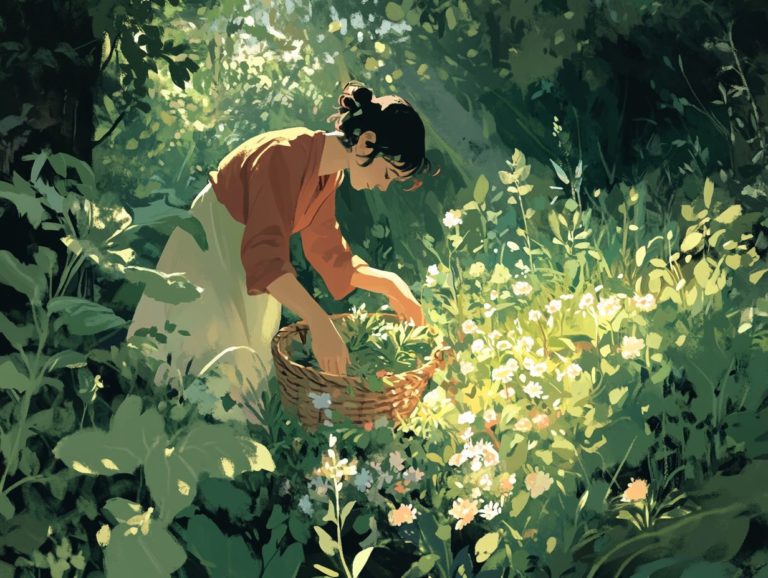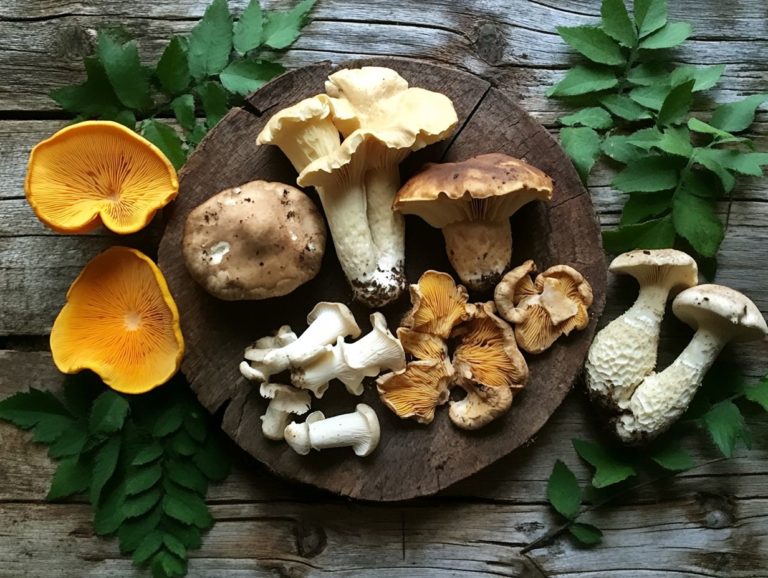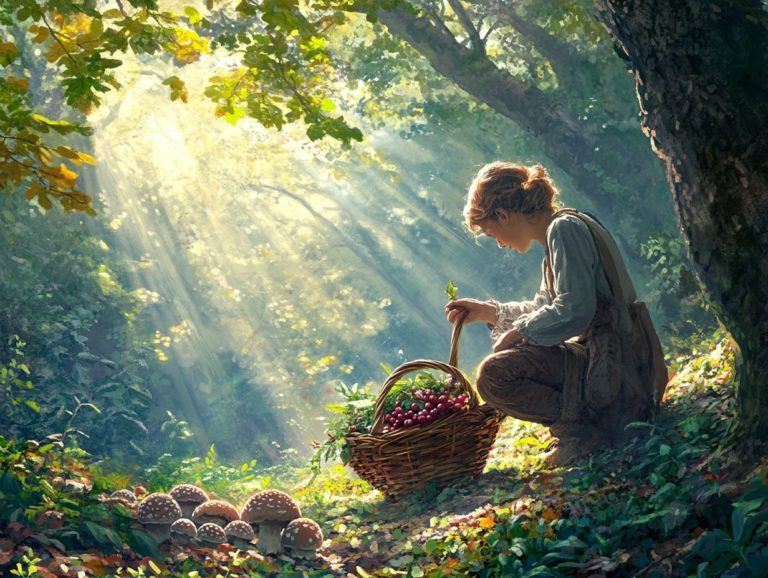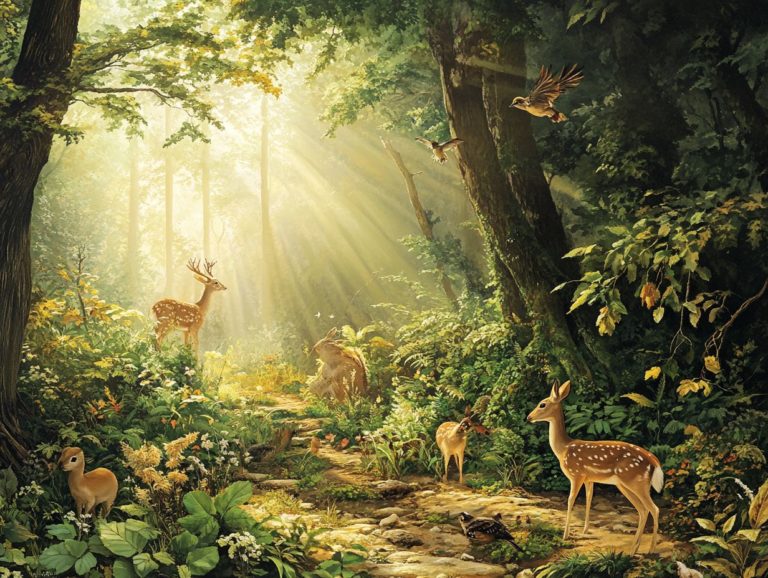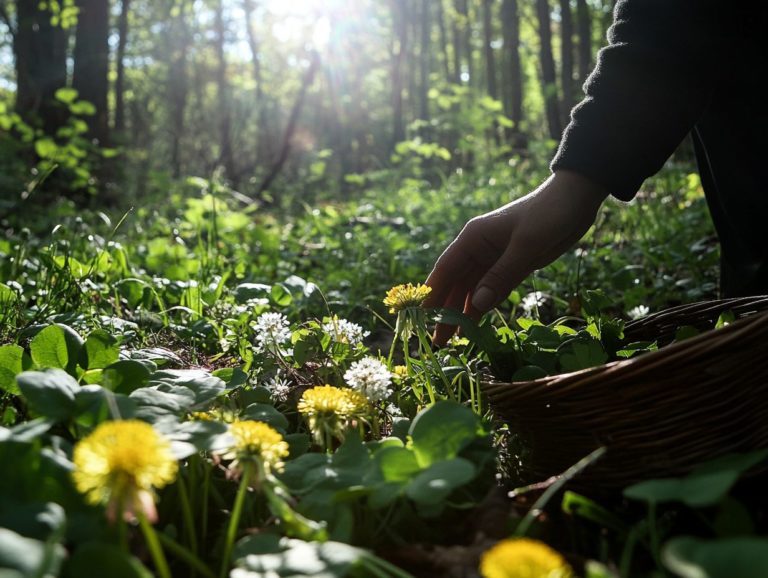How to Respect Indigenous Foraging Practices
Indigenous foraging practices are not just about gathering food; they are steeped in tradition, history, and a profound connection to the land.
This exploration delves into the significance of these practices for Indigenous communities. It illuminates the detailed knowledge about foraging that has been meticulously passed down through generations.
As you reflect on the challenges posed by colonization and modernization, it’s crucial to recognize and respect these traditional ways of life.
Your actions can help create a fairer, sustainable future for everyone by understanding their importance and discovering ways to support them.
Embark on this journey to uncover the beauty and resilience of Indigenous foraging traditions.
Contents
- Key Takeaways:
- Understanding Indigenous Foraging Practices
- Respecting Traditional Knowledge
- Challenges and Threats to Traditional Foraging Practices
- Ways to Support and Respect Indigenous Foraging
- Frequently Asked Questions
- What are Indigenous foraging practices?
- Why is it important to respect Indigenous foraging practices?
- How can I educate myself on Indigenous foraging practices?
- What are some ways to show respect for indigenous foraging practices?
- How can I incorporate indigenous foraging practices into my own lifestyle?
- What are some potential consequences of not respecting indigenous foraging practices?
Key Takeaways:
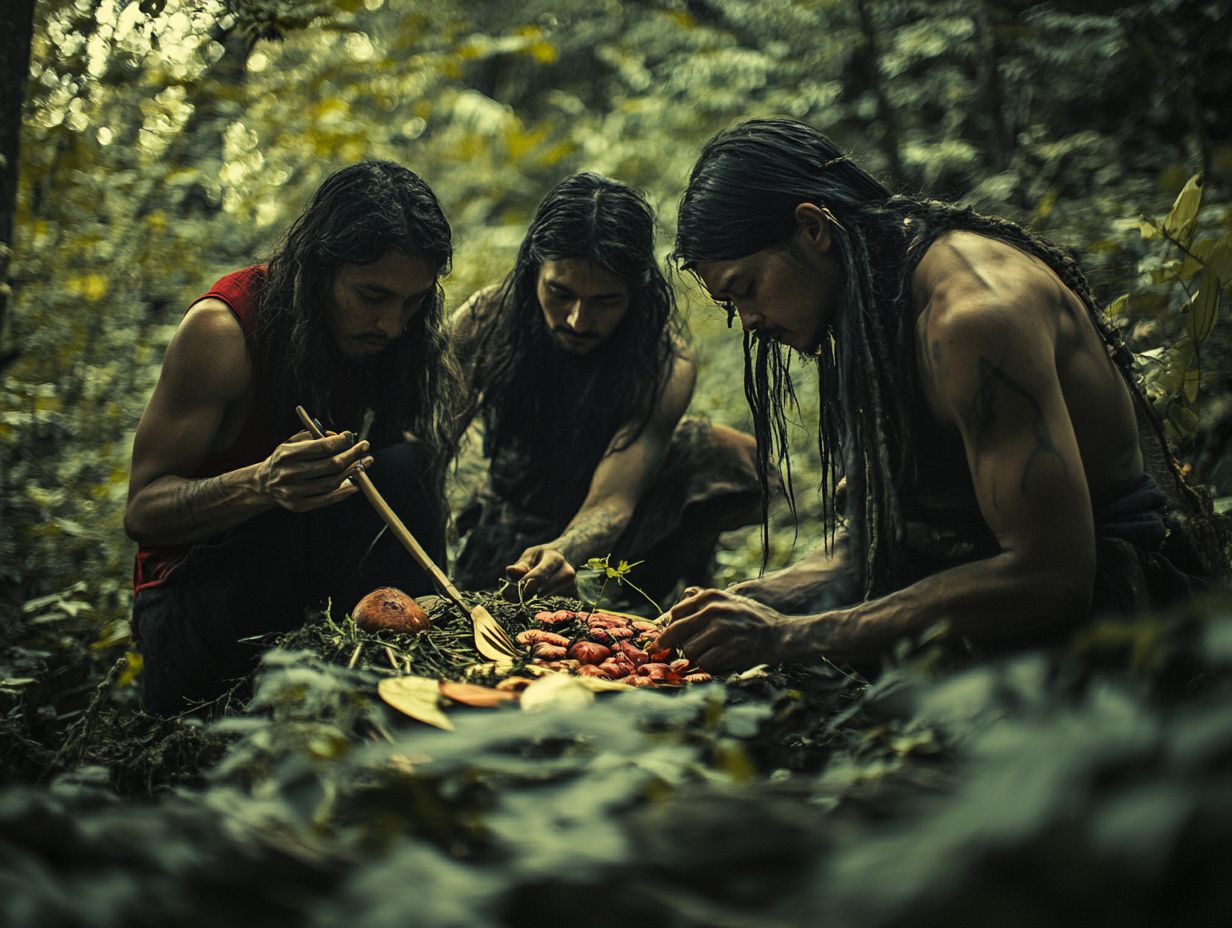
- Recognize and value the traditional knowledge systems of Indigenous communities when foraging. Understand the history and importance of foraging for these communities.
- Acknowledge and address the challenges faced by Indigenous foraging practices, such as colonization and modernization. Advocate for their rights and support land protection efforts.
- Show respect by collaborating with Indigenous communities regarding foraging. This can include buying and consuming ethically sourced foods. Together, we can protect and preserve these vital cultural practices.
Understanding Indigenous Foraging Practices
Understanding Indigenous foraging practices requires appreciating the rich traditions that Indigenous communities have honed over generations, as well as knowing foraging ethics that guide sustainable harvesting.
They use local flora not just for food but also for medicinal purposes and sustainable living.
These communities embody a profound respect for nature. They emphasize reciprocity with the earth, which highlights ethical foraging and sustainable harvesting practices.
This philosophy nourishes their people while promoting environmental stewardship and biodiversity in their regions.
As these time-honored practices encounter modern challenges, it becomes increasingly vital for you to recognize and support these Indigenous knowledge systems.
This ensures their survival and fosters cultural integrity.
History and Importance of Foraging for Indigenous Communities
For Indigenous communities, the history and significance of foraging are intricately woven into their cultural identity.
This practice provides sustenance and a profound sense of belonging and connection to ancestral lands.
The selection of specific plants serves both nutritional and medicinal purposes. For instance, wild berries are not just a seasonal treat; they are a vital source of essential vitamins.
Various herbs are harnessed for their healing properties, effectively bridging the gap between nature and wellness.
Community plays a crucial role in this context. Collective efforts in foraging strengthen social ties and foster a shared understanding of the land’s abundant gifts.
Within this environment, wisdom about these resources thrives as elders impart their knowledge to younger generations, emphasizing the need to respect and preserve traditional practices.
This ensures that cultural heritage remains vibrant and alive for years to come.
Respecting Traditional Knowledge
Respecting traditional knowledge is essential for nurturing sustainable practices and grasping the intricate relationships that Indigenous cultures have cultivated with their environment.
This respect underscores the importance of mutual regard and reciprocity with the earth. It highlights a profound connection that enriches both people and planet.
Join us in protecting these vital traditions learn more and advocate for Indigenous rights today!
Recognizing and Valuing Indigenous Knowledge Systems
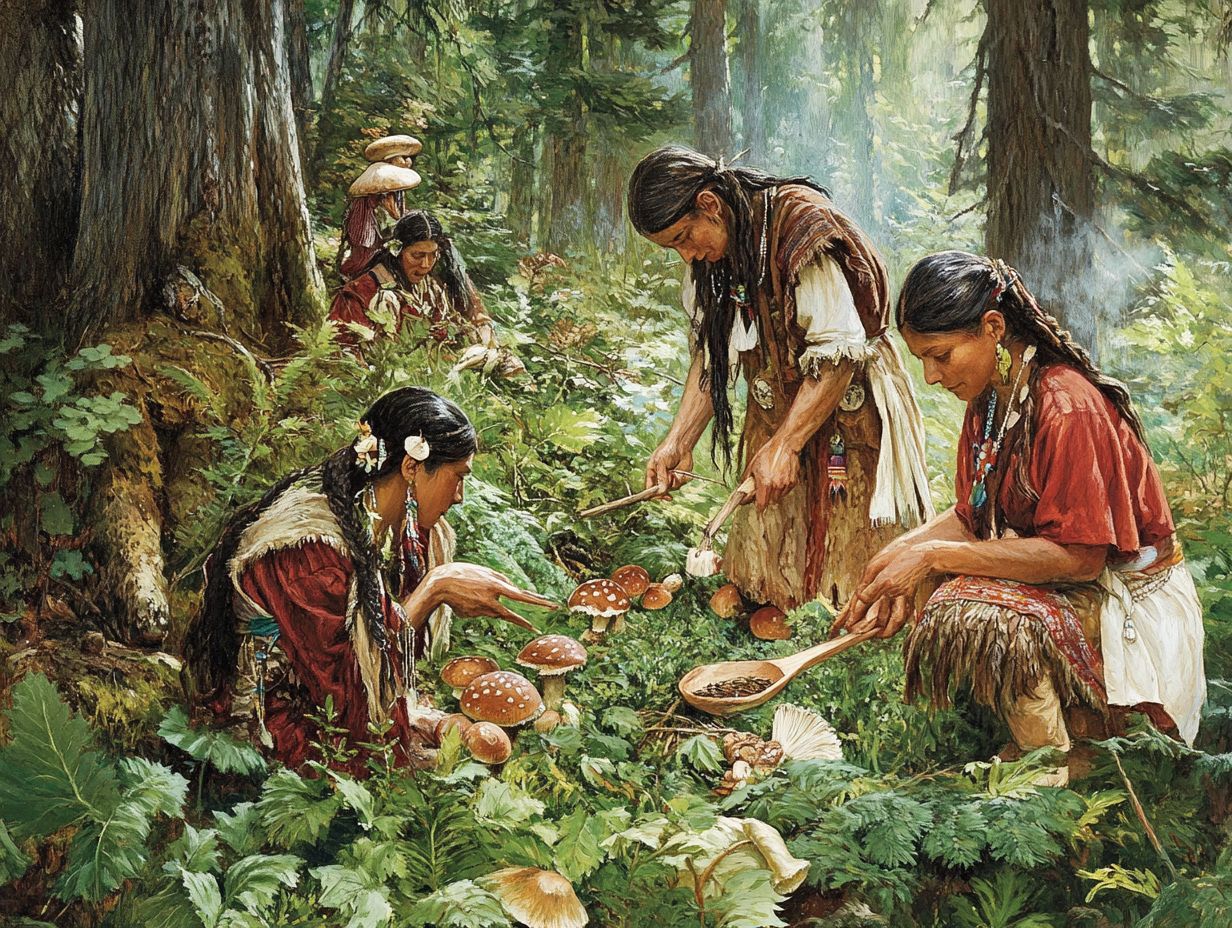
Recognizing and valuing indigenous knowledge systems is essential for understanding the holistic approaches that Indigenous cultures employ in gathering food from nature. This practice beautifully integrates environmental wisdom with practical applications for health and sustainability.
This profound understanding goes beyond merely identifying various herbal remedies derived from local flora. It underscores the critical importance of maintaining biodiversity, which is the variety of plant and animal life in a certain area.
By nurturing a deep connection with the land, Indigenous peoples have amassed a treasure trove of knowledge that is vital for conserving plant species and their ecosystems.
However, modern practices often encroach on these traditional systems. As commercial interests take precedence, the risk of losing invaluable plant identification skills and the accompanying herbal remedies becomes increasingly evident.
We must support and preserve these ancient practices for future generations.
Challenges and Threats to Traditional Foraging Practices
Traditional foraging practices encounter a multitude of challenges and threats stemming from historical colonization and the relentless march of modernization.
This situation jeopardizes not only indigenous land rights but also the health of local ecosystems, ultimately threatening the very essence of cultural heritage and sustainability.
Impact of Colonization and Modernization
The impact of colonization and modernization on traditional foraging practices is profound. It leads to a disconnection from ancestral lands and traditions.
This disconnect can significantly affect the sustainability of indigenous cultures and their ties to local flora. Throughout history, the introduction of agriculture and urbanization has transformed landscapes, turning once-lush areas into farmland and cities.
This shift has restricted access to the wild plants that communities once relied on for food, medicine, and cultural practices. Foraging has become increasingly difficult as native species make way for invasive plants that disrupt local ecosystems.
Public lands are vital in protecting these ancestral practices, providing a sanctuary to reconnect with your heritage. There is an urgent need for policies that respect indigenous land rights, ensuring that traditional foraging is encouraged.
This would facilitate the revival of cultural practices essential for a sustainable future.
Ways to Support and Respect Indigenous Foraging
Supporting and respecting Indigenous foraging means immersing yourself in the values and needs of Indigenous communities. It’s about actively engaging with them to promote ethical foraging practices that help protect nature.
Nurturing a sense of environmental stewardship honors their traditional knowledge and cultural heritage. By fostering these relationships, you contribute to a deeper understanding and appreciation of their rich practices.
Join us in honoring Indigenous knowledge and protecting our environment!
Collaborating with Indigenous Communities
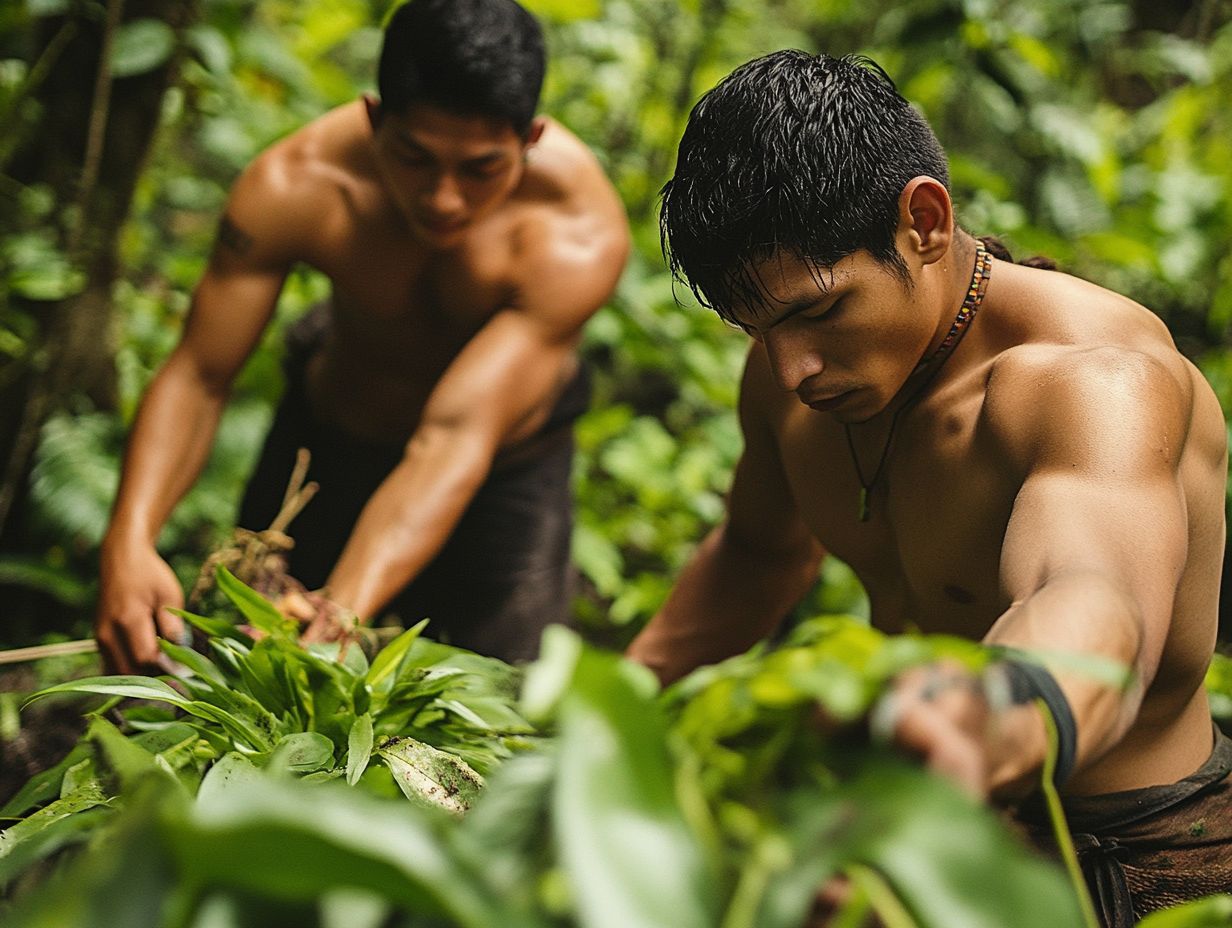
Collaborating with Indigenous communities is essential for respecting their traditional knowledge and practices. This partnership encourages responsible gathering and the sustainable use of local resources. It benefits not just individuals but also enhances community well-being.
Through initiatives like community gardens and educational programs, you can cultivate a richer understanding of the land and its offerings. By engaging in hands-on activities, you and fellow community members will discover the significance of Indigenous plants. This nurtures a sense of stewardship and appreciation for the environment.
Such initiatives pave the way for meaningful dialogue, building trust between diverse groups. As you learn about ethical foraging practices, you will develop a deep respect for the ecosystem. This ensures that resources remain available for future generations.
These collaborative efforts also unveil the wisdom inherent in Indigenous practices, weaving a stronger fabric for the community as a whole.
Buying and Consuming Ethically Sourced Foods
Buying and consuming ethically sourced foods is crucial for supporting Indigenous foraging practices. This approach ensures that the environmental impact of your food choices aligns with sustainability and respect for local ecosystems.
When you prioritize local and sustainable providers, you nurture the rich cultural traditions of Indigenous communities and contribute to the preservation of biodiversity. Supporting community gardens deepens your connection to the land and reinforces the importance of traditional farming methods that have safeguarded these ecosystems for generations.
You can empower yourself by seeking out farmers markets or participating in community-supported agriculture (CSA) programs. This allows you to make informed choices that resonate with your values. By becoming more conscious of where your food comes from and understanding its broader implications, you play an active role in fostering environmental stewardship and promoting social justice.
Advocating for Indigenous Rights and Land Protection
Advocating for Indigenous rights and land protection is essential for preserving traditional foraging practices. Understanding ethical guidelines for foraging allows Indigenous communities to continue accessing their ancestral lands and sustainably utilizing local flora, promoting environmental stewardship.
Supporting policies that prioritize these rights cultivates a deeper respect for diverse cultural identities and strengthens collective efforts toward environmental conservation. Engaging with local governments to establish robust public regulations can create frameworks that protect sacred sites and encourage sustainable foraging practices.
By advocating for legal protections, you play a vital role in safeguarding biodiversity. This ensures that Indigenous practices are recognized as integral to ecological sustainability. Your participation in grassroots movements, educational campaigns, and policy discussions can significantly amplify the voices of Indigenous communities as they advocate for their rights and livelihoods.
Frequently Asked Questions
What are Indigenous foraging practices?
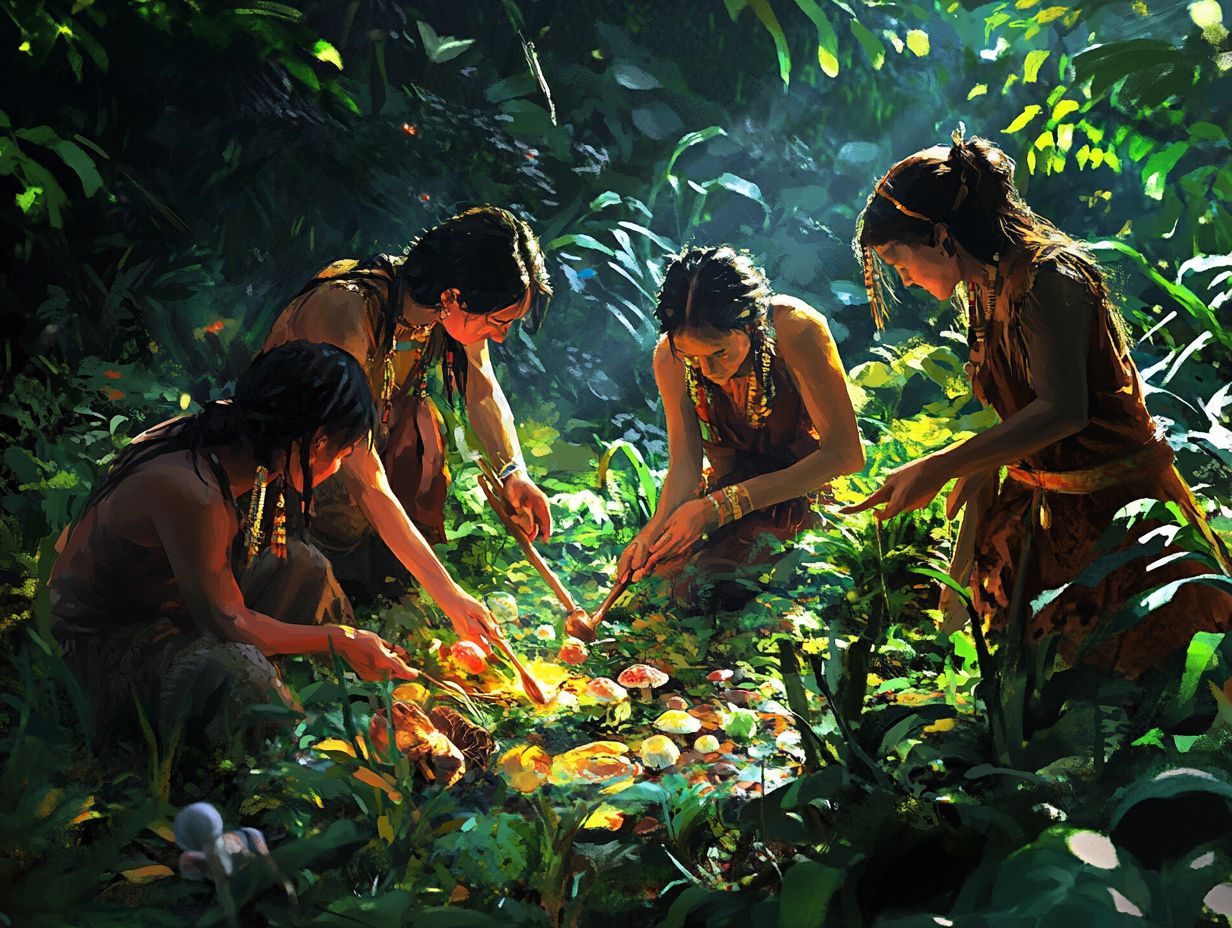
Indigenous foraging practices refer to the traditional methods and techniques used by Indigenous communities to gather and utilize natural resources for survival.
Why is it important to respect Indigenous foraging practices?
Respecting Indigenous foraging practices is important for preserving cultural traditions, promoting sustainability, and understanding how to use local resources for sustainable foraging, which ultimately protects the rights and well-being of Indigenous communities.
How can I educate myself on Indigenous foraging practices?
Dive into the world of Indigenous foraging by reading books and articles, attending workshops or cultural events, and engaging with Indigenous communities and individuals.
In summary, working together with Indigenous communities not only enriches our understanding of sustainable practices but also creates a lasting impact on the environment and society. Act now to learn about these vital practices!
What are some ways to show respect for indigenous foraging practices?
Respect indigenous foraging practices by asking for permission before gathering on their land. Additionally, familiarize yourself with foraging etiquette by disposing of waste properly, avoiding over-harvesting, and supporting indigenous-owned businesses.
How can I incorporate indigenous foraging practices into my own lifestyle?
You can learn from indigenous communities and collaborate with them. Support sustainable foraging and use traditional ingredients in your cooking.
What are some potential consequences of not respecting indigenous foraging practices?
Disrespecting these practices can lead to cultural loss and harm to natural resources. It can also negatively impact indigenous communities and reinforce harmful stereotypes.

